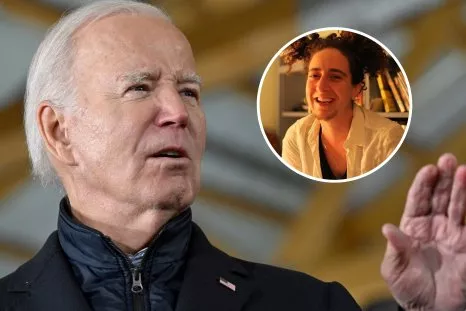Is Biden Becoming a Wartime President?
From the start of the war between Israel and Hamas, President Biden has been adamant that he won't send U.S. troops to fight in the Middle East. Biden has drawn a similar line in Ukraine.
But as Israel's ground operation in Gaza intensifies, and Ukraine continues a grueling fight to remove Russia from its borders, the United States is now actively aiding allies in the deadliest Middle East war in years and the largest land war in Europe since World War II.
The growing U.S. role in both wars has sparked a debate over Biden's part in the conflicts, and whether he has effectively become a wartime president, even if American soldiers are not fighting and dying overseas.
"Technically, he's not a wartime president," Stephen Hadley, who served as the national security adviser to former President George W. Bush, told Newsweek, since U.S. forces have not been deployed to Ukraine or Israel.
But he also noted that Biden is providing "training, materiel and financial assistance to allies in conflict zones. That is analogous to a wartime president, [and] in some sense, his behavior has to be the same."
Biden's commitment to Ukraine and Israel have led the U.S. to become "heavily involved" in two wars, Chuck Hagel, a former secretary of defense in the Obama administration, told Newsweek. "We are supporting Ukraine and Israel with everything but troops on the ground," he said.
Still, Hagel and others argued there were major differences between Biden's approach and past wars in which America was a direct participant.
There were more than 150,000 U.S. troops in Iraq at the height of the Iraq War, and the number of American forces in Afghanistan peaked at 111,000. Biden brought the last of those troops home from Afghanistan in 2021, fulfilling his campaign pledge to end America's "forever wars."
Domestic politics have changed as well since Bush launched the Iraq and Afghanistan wars. He won reelection by running as a wartime president, but Biden will "not get to be George Bush in 2004," James Zogby, the president of the Arab American Institute, told Newsweek. "Americans aren't thinking we have to win [these wars] because if we don't our lives are at stake."
There is no standard definition of a "wartime" president. The term has typically been reserved for presidents—such as Franklin D. Roosevelt, Harry Truman and George W. Bush—who sent U.S. troops to fight overseas and had to rally Congress and the public around America's direct involvement in a foreign war. But over time it has also been applied more loosely to presidents who are said to adopt a "wartime footing" in the face of grave threats to U.S. national security.
Biden reiterated his opposition to deploying U.S. troops abroad in an Oval Office speech delivered the day after he visited Israel in the first weeks of the war between Israel and Hamas.
But Biden also used the primetime address to argue that global peace and prosperity depends on America playing an active role in helping democratic allies stand up to threats from terrorist groups and autocratic regimes.
"American leadership is what holds the world together," Biden said. "To put all that at risk if we walk away from Ukraine, if we turn our backs on Israel, it's just not worth it."
Political Capital and Taxpayer Dollars
In both cases, Biden is spending significant political capital—and taxpayer dollars—to uphold an international order that enjoys support among allies abroad but is increasingly under attack from Republicans at home.
Congress has approved $113 billion in humanitarian, economic and military aid to Ukraine. The total will grow if lawmakers agree to some or all of Biden's latest request for an additional $106 billion for Ukraine, Israel and border security in the U.S.
A debate in Congress over funding for Ukraine nearly caused a government shutdown earlier this year. It helped lead to the ouster of former House Speaker Kevin McCarthy. His successor, Speaker Mike Johnson, is a vocal opponent of continued Ukraine aid, and Republicans and the White House remain far apart on a deal ahead with just two weeks left before the government is set to run out of funding in mid-November.
Biden did not seem destined to preside over a bitter foreign policy fight—or to wind up serving as ally-in-chief in two active wars—when he took office.
With the exception of the chaotic U.S. withdrawal from Afghanistan, the first months of Biden's presidency were dominated by domestic issues, including the sluggish economy, inflation and the nation's recovery from the pandemic.
Since then, however, the White House has been consumed for long periods of time in responding to foreign crises.
"Certainly foreign policy is now front and center," James Jeffrey, a former U.S. ambassador to Iraq in the Obama administration, told Newsweek.
In response to a request for comment, a White House official said President Biden was focused on maintaining support for Ukraine and Israel while preventing both conflicts from escalating.
"He has been president of the United States at a time when two significant wars have broken out in different parts of the world, and he has rallied our partners and allies to take part in a strong coalition to support Ukraine and Israel," a spokesperson for the National Security Council told Newsweek. "But he's managed those escalation risks, particularly with Russia, without actually committing U.S. forces to the fight."
"The United States is not at war, and President Biden is not a wartime president," the official added.
Biden's policy of supplying military assistance to allies without deploying U.S. troops isn't new. Presidents have long used the strategy to exert American influence abroad in proxy fights with adversaries, most notably in the decades-long standoff with the Soviet Union during the Cold War.
"This is how a lot of American influence overseas is exercised. In some ways it's a continuation of the pre-9/11 era," Julian Zelizer, a professor at Princeton University and leading presidential historian, told Newsweek.
"It might be that Afghanistan and Iraq were anomalies in the post-Vietnam age, and maybe the norm is limited involvement like Operation Desert Storm," Zelizer added, referring to the Gulf War, "or indirect involvement through support as we're seeing in both of these conflicts today."
Cold War Echoes
Biden's focus on the growing rivalry between the United States and China also harkens back to the Cold War-era policy of containment without direct military confrontation.
"It's a return to the Cold War norm of trying to wield and exercise American power to deter certain threats, including authorizing and enabling the lethal force by our allies to kill others," William Inboden, a professor at the University of Florida, told Newsweek.
But the great power competition of today is far more complex, because it requires the U.S. to contend with China as well as a resurgent Russia and threats from Iran and North Korea, said Inboden, a former senior National Security Council adviser under George W. Bush.
"Some of the old containment models are going to be insufficient for this moment," he added. "That's why Biden is facing a difficult hand."
Biden is keenly aware of the forces reshaping the geopolitical landscape, according to people who know the president well and have worked closely with him on foreign policy and national security matters.
As vice president, Biden was often the one in the room in major foreign policy debates with former President Barack Obama and other officials asking "what are the consequences, how does this end, and when does this end?" Hagel said.
"He's very serious about foreign policy," Hagel added. "He makes his own judgments, but he listens to everybody and that's what you want in a commander-in-chief."
The approach has carried over to his tenure as president. Inside the White House, there is immense confidence that Biden's decades of experience in foreign policy and close personal relationships with world leaders will help the U.S. navigate volatile world events.
"You have to play the hand that gets dealt," Brian McKeon, a former senior Biden administration official, told Newsweek. "In some ways, Biden has been training for moments like this all his life."
Whether the hand he was dealt means he's a wartime president of sorts or not, his involvement in Ukraine and Israel has tied his legacy to the outcome of both wars, said Princeton's Zelizer.
"There's no way he can extricate himself from this being a central part of his presidency," Zelizer said. "This is where the guy who brings all this expertise on foreign policy and diplomacy has to show his chops."
Disclaimer: The copyright of this article belongs to the original author. Reposting this article is solely for the purpose of information dissemination and does not constitute any investment advice. If there is any infringement, please contact us immediately. We will make corrections or deletions as necessary. Thank you.





